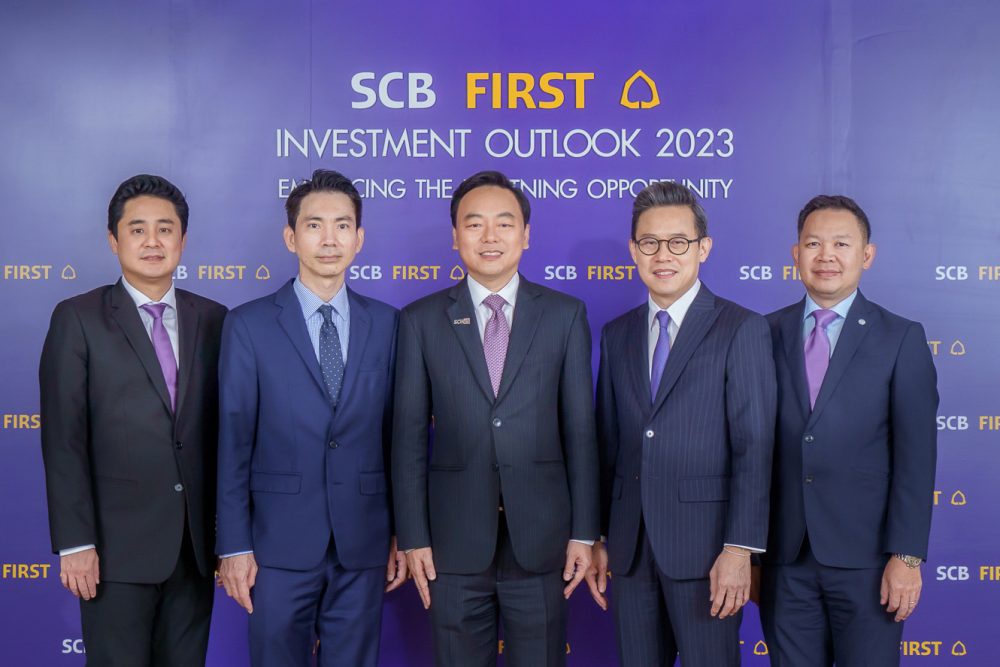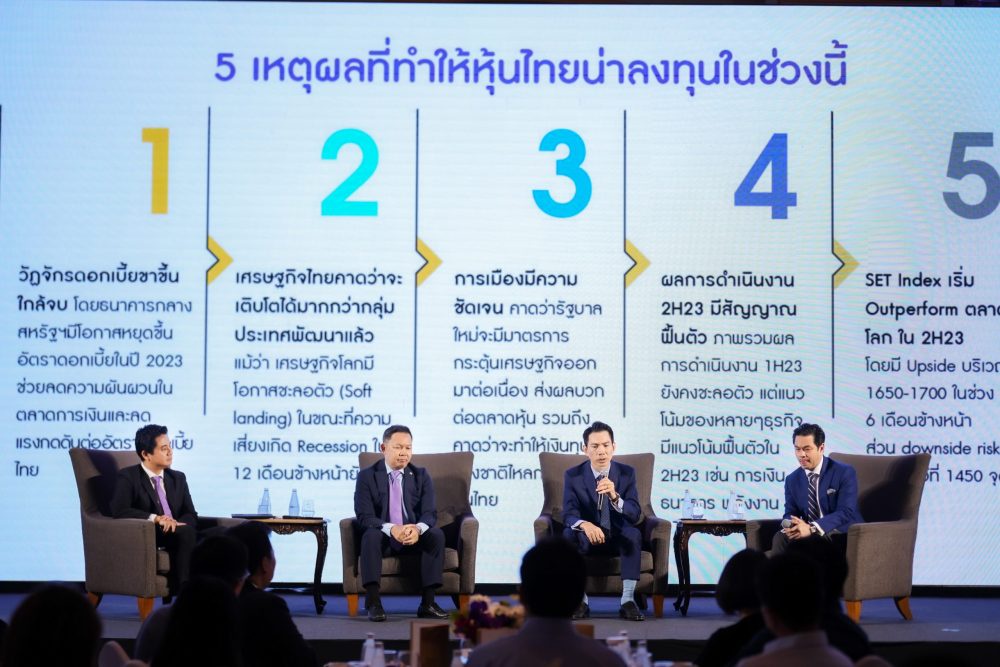Dr. Yunyong Thaicharoen, Senior Executive Vice President, Chief Wholesale Banking Officer, and Chief Wealth Banking Officer at Siam Commercial Bank, shared insights during the SCB FIRST INVESTMENT OUTLOOK 2023 seminar titled "Embracing the Lightning Opportunity." He discussed the impact of the volatile global capital market conditions following the COVID-19 pandemic, which led to significant shifts in investment strategies. This included the rise in inflation, prompting central banks worldwide, including Thailand, to raise interest rates and maintain them at elevated levels, subsequently affecting financial institutions in the United States and contributing to a slowdown in the Chinese economy, which appears to have peaked. While global inflation remains higher than the monetary policy framework of several countries, there is a noticeable trend toward its reduction. The US economy may experience a modest slowdown but concerns about a recession are receding.
Turning to the economic landscape in Thailand, the transition to a new government offers greater clarity on investment opportunities. Investments related to climate change solutions are becoming increasingly attractive, aligning with the global push toward achieving net-zero carbon emissions. Siam Commercial Bank is firmly committed to ensuring its lending and investment portfolio becomes net zero by 2050. Additionally, the bank remains dedicated to identifying investment products that can deliver strong returns for customers, ensuring stability in their investment portfolios, and standing by its customers in pursuit of sustainable wealth.
Dr. Kampon Adireksombat, First Senior Vice President and Team Head of SCB Chief Investment Office at Siam Commercial Bank, provided insights into the rapidly changing economic landscape. In the United States, interest rates have soared from 0.25% to 5.5% in just 18 months, contributing to a moderation in inflation despite a robust labor market. Consequently, we are revising our outlook for the US economy to a "soft landing." We anticipate a monthly reduction of 0.2% in US inflation, reaching approximately 2.4% next year. The interest rate is approaching the end of its upward cycle but is expected to remain high until mid-2024. Short-term bonds currently offer higher yields than long-term bonds, resulting in an inverted yield curve. We anticipate this curve to start normalizing over the next six months and by mid-2024, long-term bond yields should exceed short-term yields once more.
Furthermore, we observe a slower-than-expected economic recovery in China. Concerns arise about a potential balance sheet recession, where businesses and households prioritize debt repayment over consumption and investment due to elevated debt levels and asset price declines. This trend could lead to a "Lost Decades" scenario, similar to Japan's experience in the 1980s-2000s. Unlike Japan, China's property market hasn't experienced a bubble, and its commercial banking sector maintains relatively low levels of bad debt (with the latest NPL in China at 1.6% compared to Japan's 6.2%). Chinese commercial banks maintain robust capital bases and liquidity.
Regarding stock valuation, developed country stocks are relatively expensive, with the S&P 500 Index trading at a P/E level of 19-20 times, still within the average range. We advise investors to continue holding US stocks but consider accumulating more during favorable market conditions. Emerging market (EM) stocks in Thailand, China, and Vietnam, offer attractive prices but come with associated risks. We hold a Neutral view on Vietnamese stocks, recommending holding existing positions but not increasing them due to the slowing Vietnamese economy. Meanwhile, the operational performance of listed companies surpassed expectations.
For the Chinese H-Share stock market, we maintain a Neutral view. Despite recent gains of 5-6%, geopolitical concerns may lead to ongoing market fluctuations. In contrast, the Chinese A-Share stock market, focused on domestic demand, presents an opportunity for gradual buying. These stocks trade at a P/E ratio lower than the average, around 11-12 times. Issues in China's real estate sector are expected to primarily affect the bond market, with individual stocks facing limited impact due to their relatively low market value. For Thai stocks, we recommend gradual buying as political uncertainty has substantially decreased, and the economy and corporate profits for listed companies are expected to have bottomed out in the second quarter.
Mr. Sornchai Suneta, Executive Vice President of SCB Investment Office and Product Function at Siam Commercial Bank, shared valuable insights on the appeal of US dollar-denominated products compared to their Thai baht counterparts across various risk profiles. Low-risk options, such as US dollar money market funds, present an opportunity for attractive annual returns, approximately 5.0%, as opposed to the Thai baht's approximate 1.68% annual return. For those seeking medium-risk products that prioritize capital preservation in volatile markets, one-year Double Shark Fin Notes in US dollars offer returns ranging from 0-15% per year, whereas Thai baht equivalents yield 0-10% annually. For investors with a higher risk appetite, products like KIKO, which are structured debentures tied to stock market movements, are expected to exhibit sideward trends. At the end of the contract, investors may receive their principal either in cash or underlying shares, contingent upon the stock price remaining above the agreed-upon Knock-in level. KIKO products denominated in US dollars yield approximately 15-25% annually, while those in Thai baht yield around 6-10% per year.
In summary, these strategies provide enhanced investment opportunities, aligning with expected market movements. However, investors concerned about currency exchange losses should consider that short-term exchange rate dynamics are likely to remain within a certain range, with various factors balancing each other out. Factors contributing to this stability include the recovery of tourism, a current account surplus, and rising gold prices. On the other hand, the baht's depreciation is influenced by its closer association with the yuan due to increased trade relations with China. The weakening direction of the yuan exerts pressure on the baht, coupled with foreign investment outflows and declining gold prices, prompting investors to sell baht for gold, among other factors. Given these considerations, we believe that if the baht continues to move within the 34-35.50 baht per US dollar range, it presents a suitable level for investors to gradually convert US dollars for overseas investments.
Mr. Sukit Udomsirikul, Managing Director of the Research Group at InnovestX Securities Co., Ltd., highlighted positive signs of recovery in the performance of listed companies for the second half of the year. Anticipating policy shifts, once the new government is fully formed, there is an expectation of increased domestic consumption and private investment, which should result in stronger growth in the latter part of the year. The Thai stock market faced a 10% decline in the first half of the year, with investment flows redirecting to other markets like Taiwan, South Korea, China, and India. However, as foreign investors reduced their selling pressure, the Thai stock market began to rebound, presenting a favorable timing for potential investments. Thailand's political stability further enhances its attractiveness as an investment destination. Foreseeing the potential for the Thai stock market to reach between 1,650 and 1,700 points in the next six months. In terms of downside risks, the index is currently trading above 1,500 points but is thought to have reached its low point, with an estimated floor at 1,450 points. While some large stocks have yet to recover to pre-election levels, medical stocks have seen modest increases, indicating room for growth. Earnings growth is evident in various sectors, including energy, tourism, medical, retail, and commerce.
Specifically, certain stocks are expected to benefit from the new government's policies. Retail and food and beverage stocks stand to gain from policies such as digital money distribution and farmers' debt moratoriums. The policy aimed at reducing fuel and electricity costs is likely to benefit entrepreneurs, while an increase in the minimum wage should boost laborers' income. Additionally, stocks influenced by the global economic cycle, such as those in the semiconductor and electronics sectors, are expected to see positive effects.
In terms of investment strategies for the second half of the year, based on performance trends, four industries and eight top stocks are identified: 1) Energy sector, benefiting from recovering oil prices, including PTT and BCP; 2) Electronics sector, with demand surges during peak seasons, featuring KCE and HANA; 3) Tourism segment, expected to rebound, including AOT and ERW; and 4) Health sector, particularly benefiting from higher income from foreign patients, with BDMS and BCH among the prominent options.
Source: Siam Commercial Bank

